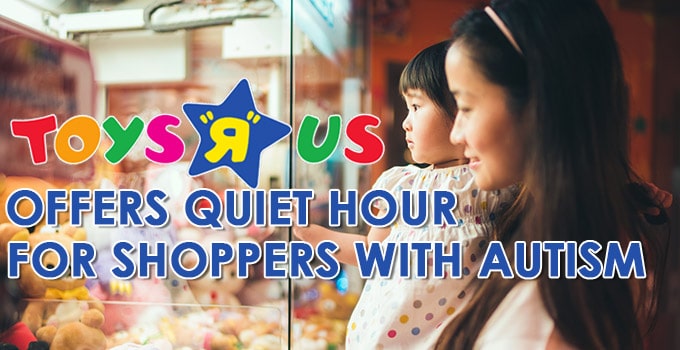Toys “R” Us Quiet Hour Helps Shoppers on Autism Spectrum Get Their Holiday Shopping Done
July 2024 by couponlab

Let’s be real; holiday shopping is chaos. The crowds. The holiday music. The frequent announcements. It can get pretty overwhelming really fast.
For people who fall on the autism spectrum, the holiday shopping season can be an overabundance of stimulation, making it particularly challenging for them to get their holiday shopping done. According to Juliana Barker, director of the TRIO Student Support Services at Rock Valley College in Rockford, Ill., everything from “the bright colors and twinkling lights, seasonal smells and aromas, the size of crowds, seasonal displays creating a lack of personal space, to the music playing a little louder than normal” can trigger a behavior or reaction from an autistic person.
That’s why Toys “R” Us locations in the UK are offering a “quiet hour” on Sunday, Nov. 6, for those on the autism spectrum and their families. According to the Manchester Evening News, every store in the UK will open for one hour just for families of children with autism and other special needs. During this time, all lights will be dimmed, music and announcements will be turned off, autism-friendly signage will be posted and a quiet area will be made available to anyone who needs to take a break. The goal is to allow families with special needs children to do their holiday shopping in an everyday environment, something that can be challenging for children affected by autism.

“Holding such events has given our teams extreme pride in reaching out to autism groups within their community,” Toys “R” Us Marketing and E-commerce Director Mike Coogan said to the Manchester Evening News. “Making slight adjustments to stores and creating a ‘quiet’ shopping period allows children and young adults to experience the fun in a toy shop regardless of their disability. We understand toys are more personal to many additional needs individuals, so being able to relax and choose something special themselves and enjoy the facilities and content of the store, the same as other children can do without concerns, will help in making their Christmas truly magical.”
According to The Mighty, this is the third year Toys “R” Us locations in the UK have offered a quiet hour for holiday shoppers, but no comparable events have been held in the U.S. yet. However, Toys “R” Us is working on bringing this to the U.S., says Candace Disler, assistant manager of Public Relations for the U.S. locations.
“We’re working on a plan to test these types of opportunities on a local level – pairing our stores with local organizations to create an event for kids with special needs and their families, and will also assess opportunities to scale it nationally,” says Disler.
Barker says families in the U.S. would benefit from quiet hour shopping events. “Families have to plan their days around potential issues or triggers that could happen,” says Barker. “Having a known set shopping time could be accommodated for and planned for to make it a successful time for the person with autism. This type of special accommodating environment may be just what someone needs to go to a toy store.”
In the absence of quiet hour events in the U.S., Barker suggests U.S. retailers try to be better equipped to help shoppers’ diverse needs. Staff should be trained on basic dos and don’ts of helping someone on the autism spectrum, including:
- Do not touch people
- Help to minimize distractions
- Offer to expedite the check-out experience or assist shoppers with carrying purchases out to the car if a family member is having a meltdown
- Allow sample or test toys to be available to use while in the store
- Do not spray people with perfume as they walk by
The bottom line, Barker says, is to just have exceptional customer service.
For shoppers who might encounter a family with a person who is on the autism spectrum, Barker asks that they “be respectful of families having a meltdown or issue in public. Parents and family members do not deliberately cause this, and they are not being lazy parents; they are dealing with a situation where the stimulus has caused a behavior to trigger, and the resulting behaviors from that trigger may not be what is deemed as socially acceptable in that current environment.”
Disler could not share any information on when this might launch in the U.S. or what locations would be selected to test out this program. We’ll post an update when Toys “R” Us has more to share.